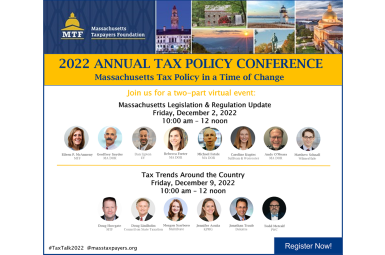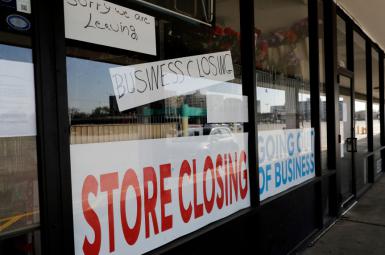“I think there will be significant economic consequences,” Eileen McAnneny, president of the Massachusetts Taxpayers Foundation, said in an interview. McAnneny and the foundation have been vocal opponents of the amendment, specifically arguing that there’s no guarantee the tax revenue will actually fund education and transportation initiatives.
Massachusetts Taxpayers Foundation President Eileen McAnneny said changes to capital gains and estate taxes are of particular interest to retirees. "People in retirement certainly are thinking about where they'll choose to retire, and cost structure absolutely matters," she said.
On behalf of the Massachusetts Taxpayers Foundation, I write to express my support for An Act to Improve Massachusetts Competitiveness and Reduce the Cost of Living. The package proposed by Governor Baker is fiscally responsible and positions the Commonwealth for future growth while targeting those most in need of tax relief. Several of the provisions make the income tax code more progressive by reducing the tax liability of those filers with limited means in a way that is not harmful to the economic landscape.
On behalf of the Massachusetts Taxpayers Foundation, I write to express my support for House Bill 2881: An Act Relative to the Massachusetts Estate Tax Code. Massachusetts Taxpayers Foundation is a non-partisan, nationally recognized, non-profit public policy research organization focusing on the state’s fiscal and economic health. We have a long track record of providing independent, high quality analysis of important issues facing the state and we have a longstanding reputation for credibility and objectivity.
Eileen McAnneny, president of the Massachusetts Taxpayers Foundation, noted that the risk of losing the state’s aging population to other states like Florida and New Hampshire has created a ripple effect on the state’s other revenues, including capital gains taxes, interest, dividends, and sales tax.
Eileen McAnneny, president of the Massachusetts Taxpayers Foundation, noted that the risk of losing the state's aging population to other states like Florida and New Hampshire already has a ripple effect on the state's other revenues, including capital gains taxes, interest, dividends, sales tax and more. The Herald reported earlier this year that the state lost $20.7 billion in adjusted gross income between 1993 and 2018.
This is a two-part virtual meeting on December 2 from 10:00 am - 12:00 noon and December 9 from 10:00 am - 12:00 noon.
Please click here or on the image below to learn about and register for this event.
“The low exemption has made it essentially a middle-class tax burden if you own real estate in the Commonwealth,” notes Eileen McAnneny, president of the Massachusetts Taxpayers Foundation.
Eileen McAnneny, president of the Massachusetts Taxpayers Foundation, is urging lawmakers to consider doing the same. “Right now the burden of replenishing the fund falls solely on businesses when the cost really should be born more broadly,” she said during a Tuesday hearing before the Legislature.
Legislators will hold a constitutional convention during this 192nd session of the General Court and are likely to vote on whether or not to advance a ballot initiative that amends the Massachusetts Constitution to impose an additional four percentage point tax on annual taxable income in excess of one million dollars.








